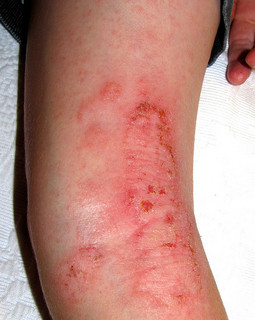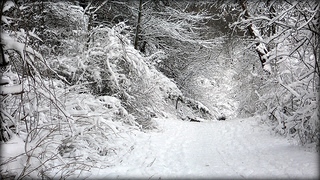Dealing with Eczema in a Cold Climate
On Jan 24, 2014
Come winter time many of us are plagued by dry, irritated, and itchy skin; the unfortunate, yet inevitable, outcome of a bitter cold climate. The even more uncomfortable truth is that weather during the winter season tends to be finicky and Mother Nature does not relent her temperamental tendencies for anyone. Needless to say those who suffer from skin conditions probably feel wronged the most in these trying times, especially people diagnosed with eczema. Do you or someone you know have eczema or have dry skin that is intolerant of the cold weather? Well you are in good company since many people suffer from these symptoms! In this article, I will review the effects of cold weather on the skin of eczema sufferers. In addition, I will point out strategies to deal with your skin in this harsh winter weather.
What Is Eczema?

Eczema, also known as atopic dermatitis, is a condition characterized by severely dry skin and is often associated with uncontrollable itch and a painful weepy rash. Eczema can affect multiple areas on the body including the cheeks, knees, wrists, eyelids, and earlobes. While eczema is more prevalent amongst children, adults are also frequently afflicted by this skin condition. Eczema is known to be the consequence of a hybrid of genetic and environmental factors. Genetics tend to have a larger impact on the likelihood of acquiring eczema. A family history is a chief indicator that one might indeed end up with it. Nonetheless, people without a single trace of eczema in the family can develop it and those who come from a family with a history of eczema may not get it at all.
One of the risk factors for eczema is having an abnormal immune system that produces an excessive immunological response towards your environment. Furthermore, research has also found that inherited skin barrier defects associated with a lack of filaggrin—a protein filament that binds to keratin fibers in the epithelial cells and acts as a skin barrier protectant—can cause eczema. People with eczema have many environmental triggers including certain foods (particularly dairy products, wheat, fruits, nuts and fish), cat dander, grass, dust mites, pollen and of course weather. Keep reading to find out more about how weather can worsen eczema symptoms and learn some ways to help alleviate them.
How Cold Weather Affects Eczema and Treatment Options
The main concern for eczema patients during winter time is that their skin gets drier than it was before. Furthermore the damp, cold climate may cause the skin to turn more resistant against treatment options. Other irritants which eczema patients may be sensitive to include any household product made with strong chemicals. Some examples are detergent, dish soap, chlorine, shampoo, soap, etc. Also as mentioned above, certain types of food and allergens such as pet dander and dust mites can irritate eczema symptoms. This does not mean one should give up on treating eczema altogether and just let nature take its toll. There are still effective ways to prevent skin conditions from worsening by taking simple measures such as applying moisturizers, taking topical steroid or immunomodulators in order to suppress mild to moderate eczema, using antiseptics in moderation and various other topical medications.
Practical Approaches to Deal with Eczema in Winter

There are several ways for patients with eczema to ensure that their skin is well shielded from the brusque nature of wintry weather. First and foremost be sure to always, always moisturize, especially areas where eczema-affected skin is bare such as the hands, face and neck. This includes applying sunscreen as well, predominantly for patients with photosensitive eczema who have a higher risk of being negatively affected by UV rays. The skin should always be protected from the biting cold winds common to winter season. All body parts that can be covered with clothing should be thoroughly protected with cotton and other fabrics that are not irritating to eczema-prone skin. Also speaking of clothes, do not use excessive amounts of detergent when doing laundry as that can further provoke the skin of eczema sufferers. In addition, if the geography of your area is predisposed to be dry all year round, invest in a humidifier to add to your home. This will aid in keeping your dry skin relatively moisturized, reducing the chances of eczema exacerbations. Furthermore try to avoid taking long baths or taking hot showers as this can also lead to itchy, dry skin. While this may seem counter-intuitive, excessive use of water actually dries out your skin by stripping it of its moisturizing oils. I know the temptation to jump in hot water and thoroughly lather yourself to counter low temperatures will arise but resist it. Instead, use a mild soap for sensitive skin such as Dove and gently wash your body in warm water.
Concluding Thoughts
With the winter season in full swing, your skin will likely thank you for taking the steps listed above. Freezing winds and the bitter cold is indeed hard to bear for anybody—with or without eczema—but you can still find easy, practical ways to protect your skin. Of course, not every method will work for everyone. Hence if your dry skin or eczema persists, we advise you to seek professional advice from your dermatologist instead of suffering the symptoms.



Comments
Leave a Comment